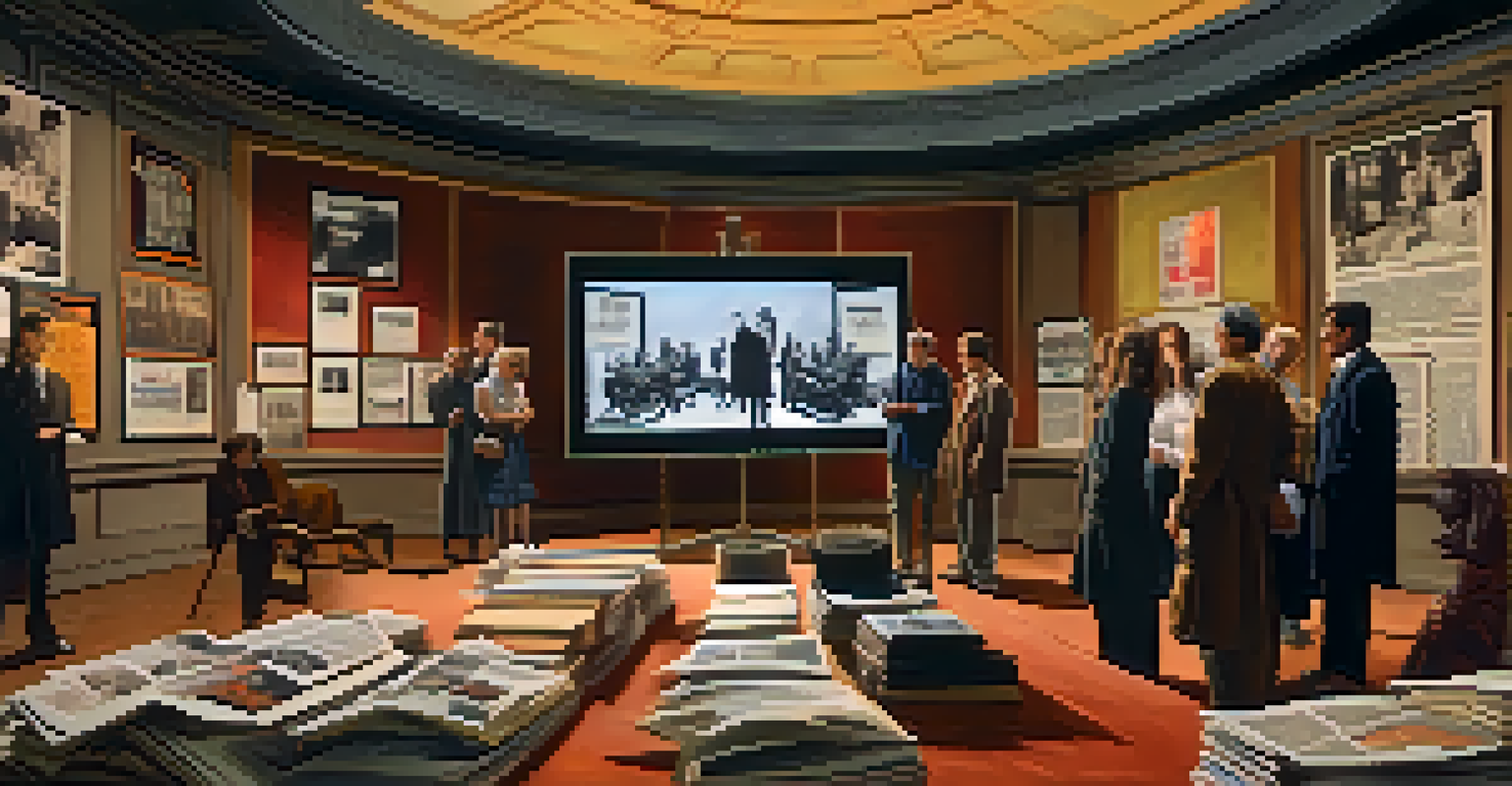The Artistic License: Hollywood's Take on Historical Events

Understanding Artistic License in Film and TV
Artistic license is a term often used in the world of film and television, allowing creators the freedom to alter facts or events for narrative purposes. This flexibility can breathe life into stories, making them more engaging and accessible to the audience. While it's essential for storytelling, it often leads to debates about the accuracy of historical portrayals.
Artistic license allows filmmakers to bend the rules of reality, but it also risks distorting the truth.
Filmmakers may choose to embellish certain details, create composite characters, or shift timelines to enhance drama or emotional impact. For instance, a movie about a historical figure might condense years of events into a single montage for pacing reasons. This approach can captivate viewers but sometimes sacrifices historical accuracy in favor of entertainment.
Ultimately, artistic license invites viewers to question what they know about history and encourages discussions about the accuracy of cinematic portrayals. It serves as a reminder that while films can be based on true events, they often prioritize storytelling over strict adherence to facts.
Famous Examples of Artistic License in Historical Films
One of the most notable examples of artistic license is the film 'Braveheart,' which depicts the life of William Wallace, a Scottish knight. While the film captures the spirit of the Scottish fight for independence, it takes significant liberties with historical facts, including characters and events. This mix of truth and fiction has sparked both admiration and critique over the years.

Another example is 'The Social Network,' which dramatizes the founding of Facebook. While it highlights the key players and events, it also exaggerates conflicts and timelines for narrative effect. This blending of fact and fiction may resonate with audiences but raises questions about the true story behind the tech giant's rise.
Artistic License Enhances Storytelling
Filmmakers use artistic license to alter facts for narrative impact, making stories more engaging but sometimes less accurate.
These examples illustrate how Hollywood often prioritizes storytelling over strict accuracy. While they can inspire and entertain, it’s essential for audiences to engage with the material critically and seek out the real stories behind the dramatizations.
The Impact of Artistic License on Public Perception
The way history is portrayed in films can significantly influence public perception. A powerful film can shape opinions and create lasting impressions about historical figures and events. For instance, movies like 'Lincoln' and '12 Years a Slave' have sparked renewed interest in their respective subjects and have even influenced educational discussions.
The best historical films remind us that history is not just a series of events, but a tapestry of stories waiting to be told.
However, the impact is not always positive. When artistic license distorts historical facts, it can lead to misconceptions. For example, some viewers may believe that a fictionalized portrayal is the definitive account of an event, which can skew their understanding of history.
This underscores the importance of critical thinking when consuming historical films. Viewers should approach these portrayals with a healthy dose of skepticism, recognizing the blend of fact and fiction as they enjoy the storytelling.
Balancing Entertainment and Historical Accuracy
Finding the right balance between entertainment and historical accuracy is a challenge for filmmakers. They must engage audiences while staying true to the essence of the events they're portraying. This balancing act often leads to creative storytelling choices that can enhance or detract from the historical narrative.
For instance, a film may choose to focus on a lesser-known event or character to provide a fresh perspective on history. This approach can make history feel relevant and relatable to modern audiences. However, it can also result in the omission of crucial context or details that are vital for understanding the full story.
Historical Accuracy Influences Perception
The portrayal of history in films can significantly shape public opinions and understanding of historical events.
Ultimately, filmmakers must navigate these challenges carefully, aiming to respect the essence of history while delivering a compelling narrative. This ongoing dialogue about the balance of fact and fiction is crucial in shaping how audiences perceive historical events.
The Role of Historians in Film Production
Historians often play a critical role in the film production process, providing insights and context to ensure a more accurate portrayal of historical events. Their expertise can help filmmakers identify key facts and nuances that might otherwise be overlooked. Collaborating with historians can enrich the storytelling by grounding it in real events.
However, the final narrative is ultimately up to the filmmakers, who may choose to prioritize drama over accuracy. This can lead to tension between historians and filmmakers as they navigate the line between creative expression and factual storytelling. The input of historians can elevate a film but does not guarantee historical fidelity.
As audiences become more discerning, the collaboration between filmmakers and historians is vital in producing quality historical content. The challenge lies in honoring the past while creating a narrative that resonates with contemporary viewers.
Audience Responsibility in Consuming Historical Films
As consumers of historical films, audiences have a responsibility to engage critically with the material. This means recognizing the artistic license at play and understanding that not everything portrayed on screen is factual. Viewers should seek out additional resources to fill in the gaps and gain a comprehensive understanding of the events depicted.
For example, after watching a film based on a historical event, it's beneficial to read books or articles that provide more depth and context. This additional research can help clarify misconceptions and offer a fuller picture of the actual events. By doing so, audiences can enhance their appreciation for both the film and the real story behind it.
Audiences Must Seek Historical Truth
Viewers have a responsibility to critically engage with historical films and seek additional resources to understand the real events behind the dramatization.
Ultimately, the relationship between film and history is a two-way street. Filmmakers have a role in shaping narratives, but audiences also bear the responsibility of seeking the truth behind the drama.
Conclusion: Embracing Artistic License Wisely
In conclusion, artistic license is a powerful tool in Hollywood that allows filmmakers to craft compelling narratives around historical events. While this can lead to engaging stories that resonate with audiences, it also raises questions about the accuracy of those portrayals. Understanding the balance between entertainment and historical fidelity is essential for both creators and viewers.
As audiences, we should embrace the art of storytelling while remaining vigilant about the historical context. Films can serve as a gateway to history, sparking curiosity and encouraging further exploration. By approaching these narratives with a critical eye, we can appreciate the artistry while recognizing the importance of the truth.

Ultimately, the dialogue between fact and fiction enriches our understanding of history. By engaging thoughtfully with historical films, we can enjoy the artistry of Hollywood while honoring the complexities of the past.